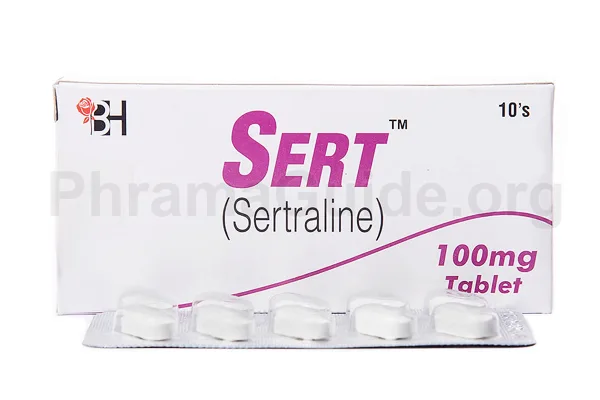Sert is an antidepressant medication that belongs to the class of selective serotonin reuptake inhibitors (SSRIs). While it is effective for many people in treating depression, anxiety disorders, and other conditions, it can also have side effects. Here are some common and less common side effects of Sert can include.
Common Side Effects
- Nausea: Feeling queasy or experiencing an upset stomach is a frequent side effect when starting Sert. It might improve over time as your body adjusts to the medication.
- Headaches: Some individuals might experience headaches or migraines, especially during the initial phase of taking Sert.
- Insomnia or drowsiness: Sert can affect sleep patterns, causing either difficulty in falling asleep (insomnia) or increased drowsiness.
- Dizziness or lightheadedness: Feeling dizzy or lightheaded upon standing or moving quickly is another common side effect.
- Dry mouth: Some people may experience a dry sensation in the mouth while taking Sert.
- Loss of appetite or weight changes: Changes in appetite, leading to weight loss or weight gain, can occur with Sert use.
- Sexual side effects: This can include decreased libido, difficulty reaching orgasm, or erectile dysfunction in men.
- Sweating: Increased sweating, especially at night, might occur.
- Tremors or shaking: Some individuals may notice tremors or involuntary shaking in their hands or other parts of the body.
- Agitation or nervousness: Sert might increase feelings of agitation or restlessness in some individuals.
- Digestive issues: This can include diarrhea or constipation.
- Skin reactions: Some people might experience skin reactions like rash or itching.
Less Common Side Effects
- Serotonin syndrome: This is a rare but serious condition that can occur when there is an excessive accumulation of serotonin in the body. Symptoms may include agitation, hallucinations, rapid heartbeat, high blood pressure, fever, sweating, shivering, muscle twitching, nausea, vomiting, and diarrhea. Serotonin syndrome requires immediate medical attention.
- Hyponatremia: In some cases, Sert can lead to low sodium levels in the blood, resulting in symptoms like headache, difficulty concentrating, memory problems, weakness, confusion, hallucinations, fainting, seizures, and in severe cases, coma. Monitoring sodium levels is important, especially in older adults.
- Bleeding abnormalities: SSRIs, including Sert, can sometimes increase the risk of bleeding or bruising due to their effect on platelets.
- Manic episodes: In individuals with bipolar disorder, Sert might trigger or worsen manic episodes, characterized by unusually high energy, racing thoughts, reckless behavior, and euphoria.
- Allergic reactions: Though rare, some individuals may experience allergic reactions to Sert, presenting as skin rash, itching, swelling, severe dizziness, or trouble breathing.
- Liver problems: In rare instances, Sert can affect liver function, leading to symptoms such as yellowing of the skin or eyes (jaundice), dark urine, abdominal pain, or persistent nausea.
- Seizures: While uncommon, some people may experience seizures while taking Sert, especially those with a history of seizures or conditions predisposing them to seizures.
- Vision changes: Rarely, Sert might cause changes in vision or eye discomfort.

What is Sert?
Sert is one of the leading brands of Sertraline, manufactured and marketed by Barrett Hodgson Pakistan (Pvt) Ltd.
Sert : Available Formulations and Strengths
Presently, Sert is available in Tablet form with the following strengths.
Sert Tablets : 50mg and 100mg strengths
What Are The Possible Drug Interactions of Sert?
- Monoamine oxidase inhibitors (MAOIs): Taking Sert with or within 14 days of discontinuing MAOIs can lead to a potentially life-threatening condition called serotonin syndrome. MAOIs include medications like phenelzine, tranylcypromine, and selegiline.
- Other antidepressants: Combining Sert with other antidepressants, such as other SSRIs (e.g., fluoxetine, paroxetine) or tricyclic antidepressants, may increase the risk of serotonin syndrome.
- Blood thinners (anticoagulants): Sert may increase the risk of bleeding when taken with anticoagulant medications like warfarin or aspirin. Regular monitoring of blood clotting parameters might be necessary.
- Nonsteroidal anti-inflammatory drugs (NSAIDs): NSAIDs like ibuprofen or naproxen, when taken with Sert, may increase the risk of bleeding or bruising.
- Benzodiazepines and CNS depressants: Combining Sert with drugs that have sedative effects, such as benzodiazepines (e.g., diazepam, lorazepam), opioids, or alcohol, can enhance the sedative effects and impair coordination and judgment.
- Lithium: Sert may increase lithium levels in the blood, potentially leading to lithium toxicity. Regular monitoring of lithium levels is necessary if taken together.
- Tramadol and other pain medications: Sert might increase the risk of seizures when taken with medications like tramadol or other drugs that lower the seizure threshold.
- St. John’s Wort: This herbal supplement can increase serotonin levels and combining it with Sert may increase the risk of serotonin syndrome.
- Cimetidine and proton pump inhibitors (PPIs): These medications used to treat ulcers and acid reflux might increase Sert levels in the blood, potentially leading to an increased risk of side effects.

Leave A Comment